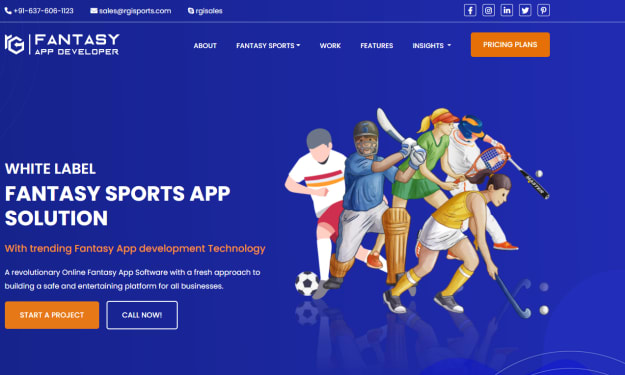10 things you should know about the fantasy sports industry!
Fantasy sports is a multi-billion-dollar industry that continues to grow each year. Check it out to get your crash course in everything you need to know about this growing niche!

Fantasy sports is a multi-billion-dollar industry that continues to grow each year. It’s also one of the most misunderstood industries out there, with many assuming that it’s only for basement-dwelling nerds and not the massive adult men (and women) who continue to fuel its growth. To help set the record straight, we’ve compiled a list of ten things you should know about the fantasy sports industry.
Check it out below to get your crash course in everything you need to know about this growing niche!
Fantasy sports is bigger than you think
Fantasy sports is a phenomenon that has been gaining popularity since the 1980s, when the first fantasy football leagues were formed by a group of guys in the office. Yet, despite the fact that fantasy sports is a well-established phenomenon, many people do not understand the scale of its popularity. In fact, the Fantasy Sports Trade Association reports that 57 million people in the United States play fantasy sports, making it the country’s second-most popular participatory sport after soccer!
What is Fantasy Sports? Fantasy sports is an online gaming solution where players build a team of real-life athletes and compete against other players in leagues. Fantasy sports used to be played by drafting actual athletes who contribute to your team. You gain points based on how these athletes perform in their real-life games. Fantasy sports is a skill game that requires knowledge of real-life athletes and the ability to put together a winning team. Players create a team by selecting real-life athletes and putting them on their fantasy roster.
Fantasy players can pick from any athlete who is on a roster in any sport. Each user will have a certain number of points to build their team. Once the team is created, the player can then track their progress over the course of a season and even playoffs.
Why is fantasy sports so popular?
There are many reasons why fantasy sports has become such a phenomenon. With fantasy sports, even if you are not actively watching the game, you can still connect to what’s happening and gaining knowledge about the sport. Other reasons why fantasy sports is so popular is that it’s free to play, anyone can win, and it’s low-pressure since there are no long-term contracts. If you don’t like playing with one group, you can easily move to another group.
Major players in the fantasy sports industry
There are many companies in the fantasy sports industry that have been at the top of their field for years. Here are a few major players in the fantasy sports industry.
DraftKings: Founded in 2012, this daily fantasy sports (DFS) site is one of the biggest names in the business. DraftKings has made headlines in recent years thanks to an aggressive marketing campaign and high-profile endorsement deals, including partnerships with the NBA and MLB.
FanDuel: Founded in Scotland in 2010, FanDuel is one of DraftKings’ main competitors in the fantasy sports industry. FanDuel has also made headlines in recent years thanks to high-profile endorsement deals and a strong brand presence.
Yahoo Fantasy Sports: Another fantasy sports site that has been around for a long time, Yahoo Fantasy Sports (Yahoo!) is one of the oldest and most well-known fantasy sports sites. Yahoo! has been one of the top names in the industry since its inception in the early 2000s.
How much money is made in the fantasy sports industry?
As mentioned, the fantasy sports industry is a multi-billion dollar industry. In fact, fantasy sports saw a revenue, generated through direct and indirect mediums, of $23.9 billion in 2017 according to Statista.
The money made through the fantasy sports industry can vary depending on the type of league (public or private), the website hosting the league and the number of people participating in the league. Public leagues are open to any player who wants to join. These leagues usually hosted on large websites such as Yahoo! or CBS Sports and are free to join. Private leagues, on the other hand, are for invited players only and are hosted on paid fantasy sports websites. These leagues will cost a small fee to join.
Problems with the current fantasy sports model
Despite being a massively popular pastime, fantasy sports has faced some criticism in recent years. One major concern is the fact that fantasy sports is gambling. There is a fine line between fantasy sports and gambling. While there is skill involved, the difference between the two is often blurred. This leads to the question of whether fantasy sports should be allowed. Another major concern is the way fantasy sports is distributed.
Fantasy sports usually distributed through a handful of large websites and companies that charge players to play. This means that fantasy sports lacks accessibility, with only a select few able to play. This is a problem as fantasy sports can bring so much to the world of sport.
New platforms emerging to solve these problems
With the aforementioned issues in mind, there are some new fantasy sports platforms emerging to solve these problems. And, these are powered by blockchain technology. One such platform is Fantasy Sports Network. Fantasy Sports Network is a decentralized fantasy sports platform. It allows players to build and manage their teams from anywhere in the world.
Another platform is FanUnik. This fantasy sports platform uses blockchain technology to create a decentralized fantasy sports platform. FanUnik also includes a mobile app for both Android and iOS devices.
Conclusion
The fantasy sports industry is a multi-billion-dollar industry that continues to grow each year. Despite being such a popular pastime, fantasy sports has faced criticism in recent years. There have been discussions about whether fantasy sports should be allowed and whether it should be distributed through centralized websites.
These discussions have led to the fantasy sports app development of new platforms that use blockchain technology to create a decentralized fantasy sports experience that is more accessible.
About the Creator
Anurag Gupta
Digital Marketing Analyst with a profound track record and eager to grab trending knowledge about the same. I am passionate to help businesses in improving their online brand visibility through my knowledge and skills.






Comments
There are no comments for this story
Be the first to respond and start the conversation.